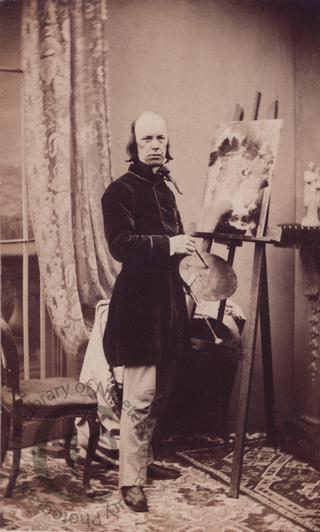
George Lance
A carte-de-visite portrait of the artist George Lance (1802-1864), chiefly remembered as a painter of still life.
Lance was born at Little Easton in Essex in 1802, the son of an adjutant in the Essex yeomanry who later became the inspector of the Bow Street horse-patrol. Although he showed a predilection for art at a very early age, he was placed, when under the age of fourteen, in a factory in Leeds. However, the uncongenial work injured his health and he returned to London. Following a chance encounter with Charles Landseer in the British Museum, Lance offered himself as a pupil to Benjamin Haydon. Still not yet fourteen, he entered Haydon’s studio and remained there for seven years, at the same time studying at the schools of the Royal Academy.
While designing a picture inspired by Homer's Iliad, he decided, before putting on the colours, to paint some fruit and vegetables as practice. This work attracted the notice of Sir George Beaumont, who purchased it, and this success led him to paint another fruit-piece, which he sold to the Earl of Shaftesbury. He then painted two fruit-pieces for the Duke of Bedford as decorations for a summer-house at Woburn Abbey, and his work proved so profitable that he decided to devote himself to the painting of still-life.
Although he gained his reputation chiefly as a painter of fruit and flowers, Lance sometimes produced historical and genre works, and his picture of Melanchthon's First Misgivings of the Church of Rome won the prize at the Liverpool Academy in 1836. His works appeared most frequently at the exhibitions of the British Institution, to which he contributed in all 135 pictures, and he also sent forty-eight works to the Society of British Artists, and thirty-eight to the Royal Academy. Besides these he exhibited many fruit-pieces and pictures of dead game, painted with great richness of colour and truthfulness to nature.
Lance died at the residence of his son – Sunnyside, near Birkenhead – on 18 June 1864.
Photographed by Maull and Polyblank of London.
Code: 125376




